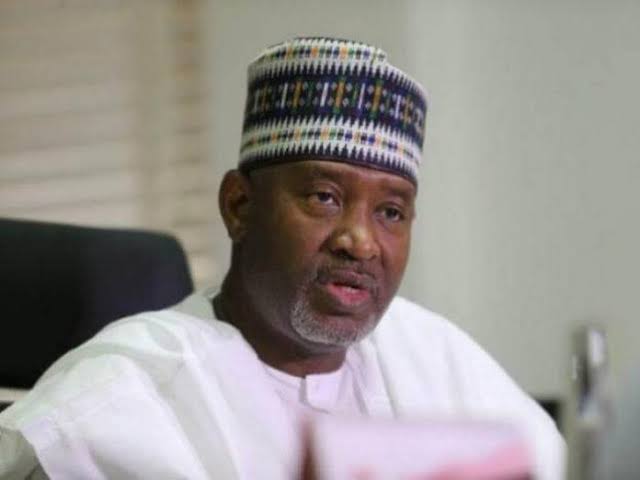A judgement on a suit filed by the Plateau State Governor Caleb Mutfwang, seeking to restore his mandate as the governor, was on Tuesday reserved by the Supreme Court of Nigeria.
A five-member panel of justices led by John Okoro reserved the judgment after taking arguments from lawyers to both parties in the case and is expected to deliver a verdict on the matter before 16 January, when the appeal will expire.
*Back story*
The governorship candidate of the Peoples Democratic Party (PDP), Caleb Mutfwang, was declared winner of the March 18, 2023 gubernatorial election in Plateau state by the Independent National Electoral Commission (INEC).
The result declared by the INEC Presiding Officer, Musa Yusuf, after counting the votes scored by parties that participated in the election, shows that Mutfwanhg had the highest votes, beating the All Progressives Candidate, Nentawe Yilwatda.
Mutfwang scored 525,299 votes to beat the All Progressives Congress (APC) candidate, Mr Nentawe Yilwatda, who garnered 481,370.
*Ensuing legal battle*
Dissatisfied with the outcome of the result, Dr Nentawe Yilwatda of the All Progressives Congress (APC) heads to court.
However, the governorship election petition tribunal in Plateau, in September, upheld the election of Governor Mutfwang of the Peoples Democratic Party (PDP) while dismissing a petition filed by Dr Nentawe Yilwatda of the All Progressive Congress (APC) on the basis that the issues raised by the petitioner on party structure were pre-election matters, adding that the petitioners lacked the jurisdiction to challenge it,
The court also held that PDP had a repeat congress on the 25th of September, 2021, in compliance with the order of the Jos High Court delivered by Justice S.P.Gang.
Furthermore, the candidate of the All Progressives Congress (APC) heads to the Appeal Court sitting in Abuja, where a three-member panel, in a unanimous decision, sacked Governor Caleb Muftwang of the Peoples Democratic Party (PDP).
The appellate court held that Mutfwang was not validly sponsored by the Peoples Democratic Party (PDP) as provided by Section 285(2) of the Nigerian Constitution, adding that the appeal brought by Nentawe Goshwe of the All Progressives Congress (APC) succeeds as the issue of qualification was both a pre and post-election matter under Section 177(c) of the Nigerian Constitution, 1999 and Section 80 and 82 of the Electoral Act, 2022.
The panel also agreed with the appellant (Goshwe) that the failure of the PDP to comply with the order of the Plateau State High Court in Jos in suit no: PLD/J304/2020 between Bitrus B. Kaze & 11 ors vs the Peoples Democratic Party & 24 ors directing it to conduct valid ward, local governments and state congresses before nominating its candidates for the various elective posts and the Court of Appeal order in CA/J1/93/2021 was a breach of the law.
Thus, the panel set aside the judgement of the Governorship Election Petitions Tribunal for being “highly inconsistent and breach of fair hearing by relying on expunged witnesses’ statements to refuse Goshwe’s appeal”.
The panel, however, ordered the Independent National Electoral Commission (INEC) to withdraw the certificate of return issued to Muftwang and issue a fresh one to Goshwe.
Dissatisfied with the judgment, Governor Mutfwang headed to the Supreme Court, urging the apex court to nullify the judgement of the Court of Appeal, which sacked him from office. The governor, who made this request in his appeal filed before the apex court by an eight-man team of Senior Advocates of Nigeria(SANs) led by Chief Kanu Agabi, accused the lower court of not giving his and his party, the Peoples Democratic Party (PDP), fair hearing.
The governor formulated eight grounds of appeal on why the Supreme Court should validate his election, where he argued that the issue of nomination and sponsorship, which underpinned Ground One of the petition by the APC, is not only a pre-election matter but within the internal affairs of the fourth
Respondent (PDP), and as such, the first and second Respondents lacked the locus standi to canvass it.
The appellant also argued that the lower court’s judgment delivered on November 19, 2023, is fatally flawed for want of jurisdiction regarding Section 285(2) of the Constitution (supra).
He insisted that disobedience of court order is not one of the grounds for maintaining an election petition under Section 134 of the Electoral Act (supra), nor is it part of Section 177(c) of the Constitution (supra), let alone disqualifying the appellant from contesting the election.
The governor further maintained that given the overwhelming oral and documentary evidence, including but not limited to EXHIBITS U and 2RA3, the fourth Respondent complied with EXHIBIT G1 by conducting a state congress on September 25, 2021, in Plateau.
He also contended that the evidence of the 16th prosecution witness was thoroughly discredited and controverted; as such, the lower court was wrong to rely on it against him heavily.
“The first and second respondents woefully failed to discharge the requisite burden of proof on them and, as such, were not entitled to the reliefs sought in their petition, more so that having impugned the election as invalid for non-compliance, it is absurd of them to lay claim to victory for the same election.
“The lower court was in grave error when it held that the Tribunal was wrong in striking out the offensive paragraphs of the appellant’s reply and utilising evidence of PW16, PW24, PW27 and PW28 as a tribunal of first instance.



